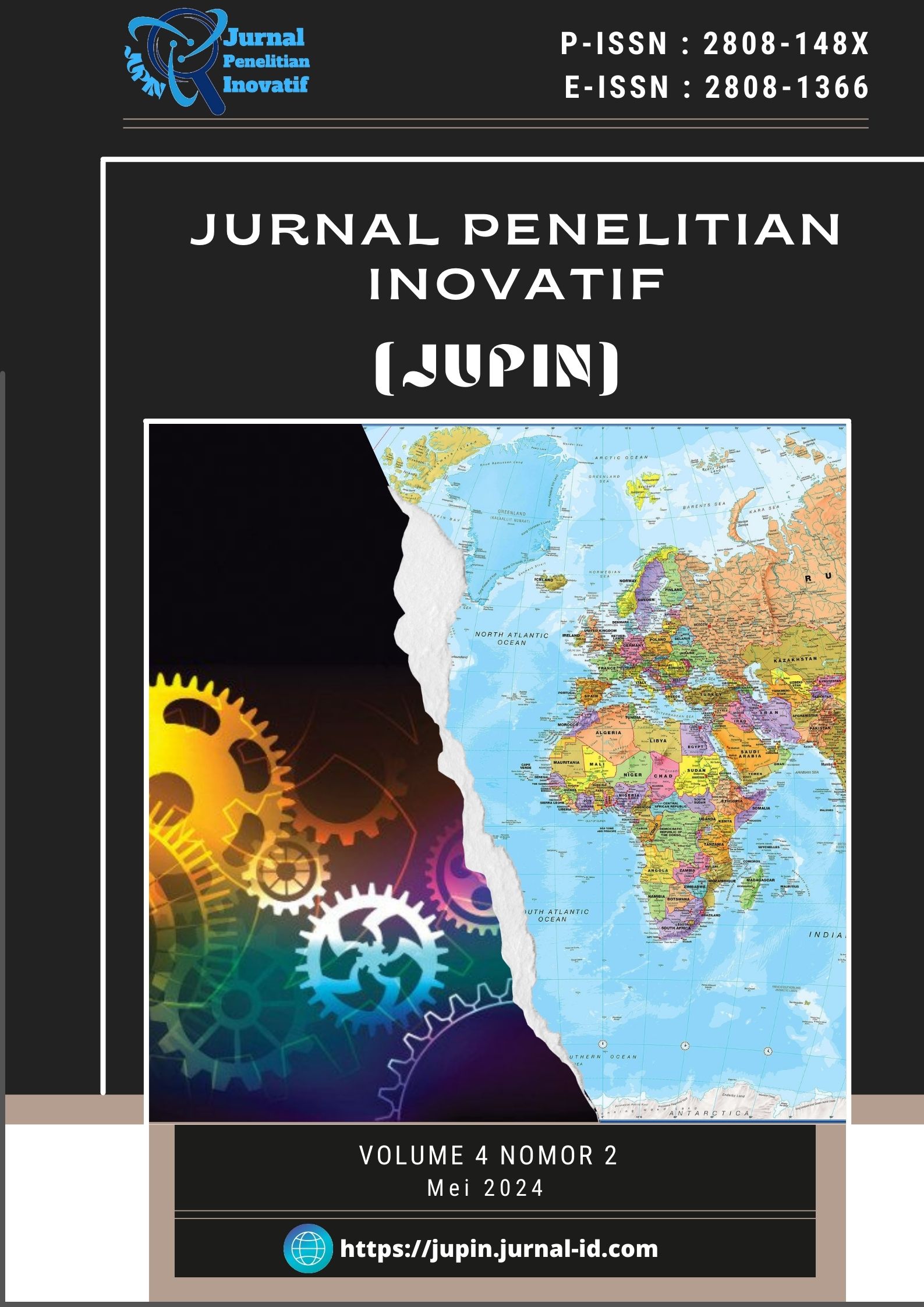The Impact of ChatGPT Technological Innovation on Civil Law Practices: Challenges, Opportunities, and Implications of Article 1338 of the Civil Code
DOI:
https://doi.org/10.54082/jupin.383Kata Kunci:
Article 1338 of the Civil Code, ChatGPT, Civil LawAbstrak
In the continuously evolving digital era, technological innovation increasingly influences various aspects of human life, including civil law practices. One intriguing technological innovation is ChatGPT, an artificial intelligence-based language model capable of generating high-quality text closely resembling human capability. This research aims to provide a deeper understanding of the impact of ChatGPT technological innovation on civil law practices, considering the challenges, opportunities, and implications of Article 1338 of the Civil Code. This study is a literature review employing a qualitative approach and descriptive analysis. Data for this research were gathered from Google Scholar within the timeframe of 2019-2024. The study's findings indicate that the introduction of technological innovations such as ChatGPT has significantly transformed the landscape of civil law practices. Despite posing several challenges, such as technological skill availability, data security, and questions regarding legal validity, ChatGPT also presents substantial opportunities to enhance efficiency and accessibility in civil law practices. Considering the legal principles underpinning civil law practices, particularly within the context of Article 1338 of the Civil Code, is crucial in evaluating the impact and utilization of technologies like ChatGPT. The necessity for collaboration between legal experts and technologists to develop guidelines and standards that guide the ethical and effective use of technology is also highly imperative.
Referensi
Ausat, A. M. A., Azzaakiyyah, H. K., Permana, R. M., Riady, Y., & Suherlan, S. (2023). The Role of ChatGPT in Enabling MSMEs to Compete in the Digital Age. Innovative: Journal Of Social Science Research, 3(2), 622–631. https://doi.org/https://doi.org/10.31004/innovative.v3i2.346
Ausat, A. M. A., Rachman, A., Rijal, S., Suherlan, S., & Azzaakiyyah, H. K. (2023). Application of ChatGPT in Improving Operational Efficiency in the Context of Entrepreneurship. Jurnal Minfo Polgan, 12(1), 1220–1228. https://doi.org/https://doi.org/10.33395/jmp.v12i1.12667
Ausat, A. M. A., Suherlan, S., & Azzaakiyyah, H. K. (2023). Is ChatGPT Dangerous for Lecturer Profession? An In-depth Analysis. Jurnal Pendidikan Dan Konseling (JPDK), 5(2), 3226–3229. http://journal.universitaspahlawan.ac.id/index.php/jpdk/article/view/13878
Basir, A., Puspitasari, E. D., Aristarini, C. C., Sulastri, P. D., & Ausat, A. M. A. (2023). Ethical Use of ChatGPT in the Context of Leadership and Strategic Decisions. Jurnal Minfo Polgan, 12(1), 1239–1246. https://doi.org/https://doi.org/10.33395/jmp.v12i1.12693
Christina Bagenda. (2023). Hukum Perdata (1st ed.). WIDINA BHAKTI PERSADA BANDUNG (Grup CV. Widina Media Utama).
Darman, R. (2024). Peran ChatGPT Sebagai Artificial Intelligence Dalam Menyelesaikan Masalah Pertanahan dengan Metode Studi Kasus dan Black Box Testing. Tunas Agraria, 7(1), 18–46. https://doi.org/10.31292/jta.v7i1.256
Fauzi, F., Tuhuteru, L., Sampe, F., Ausat, A. M. A., & Hatta, H. R. (2023). Analysing the Role of ChatGPT in Improving Student Productivity in Higher Education. Journal on Education, 5(4), 14886–14891. https://doi.org/10.31004/joe.v5i4.2563
Harahap, M. A. K., Ausat, A. M. A., Rachman, A., Riady, Y., & Azzaakiyyah, H. K. (2023). Overview of ChatGPT Technology and its Potential in Improving Tourism Information Services. Jurnal Mininfo Polgan, 12(2), 424–431. https://doi.org/10.33395/jmp.v12i2.12416
Harahap, M. A. K., Junianto, P., Astutik, W. S., Risdwiyanto, A., & Ausat, A. M. A. (2023). Use of ChatGPT in Building Personalisation in Business Services. Jurnal Minfo Polgan, 12(1), 1212–1219. https://doi.org/https://doi.org/10.33395/jmp.v12i1.12666
Johan, S., & Manurung, S. P. E. (2023). pelatihan etika bisnis dan hukum kepada mahasiswa bisnis di universitas presiden. JURNAL ABDI, 9(1), 10–14.
Jusman, I. A., Ausat, A. M. A., & Sumarna, A. (2023). Application of ChatGPT in Business Management and Strategic Decision Making. Jurnal Minfo Polgan, 12(2), 1688–1697. https://doi.org/https://doi.org/10.33395/jmp.v12i2.12956
Kretschmer, M., Margoni, T., & Oruç, P. (2024). Copyright Law and the Lifecycle of Machine Learning Models. IIC - International Review of Intellectual Property and Competition Law, 55(1), 110–138. https://doi.org/10.1007/s40319-023-01419-3
Nurdiansyah, R., & Damiri, M. A. (2023). Hukum Tentang Orang (Perbandingan Antara KUH Perdata Indonesia, Inggris Dan Amerika). Eksekusi: Jurnal Ilmu Hukum Dan Administrasi Negara, 1(4), 26–43.
Nurul Hafiza. (2023). Peluang Penggunaan Teknologi ChatGPT dalam Dunia Hukum Perdata Nasional. Proceeding of Conference on Law and Social Studies, 1–7.
Priowirjanto, E. S. (2023). sosialisasi mengenai aspek hukum dari penggunaan ChatGPT dalam dunia pendidikan di SMK Al-Wafa Kabupaten Bandung. Kabuyutan: Jurnal Kajian Ilmu Sosial Dan Humaniora Berbasis Kearifan Lokal, 2(2), 92–99.
Subagja, A. D., Ausat, A. M. A., Sari, A. R., Wanof, M. I., & Suherlan, S. (2023). Improving Customer Service Quality in MSMEs through the Use of ChatGPT. Jurnal Minfo Polgan, 12(2), 380–386. https://doi.org/https://doi.org/10.33395/jmp.v12i2.12407
Sudirjo, F., Ausat, A. M. A., Rijal, S., Riady, Y., & Suherlan, S. (2023). ChatGPT: Improving Communication Efficiency and Business Management of MSMEs in the Digital Age. Innovative: Journal Of Social Science Research, 3(2), 643–652. https://doi.org/https://doi.org/10.31004/innovative.v3i2.347
Sudirjo, F., Diantoro, K., Al-Gasawneh, J. A., Azzaakiyyah, H. K., & Ausat, A. M. A. (2023). Application of ChatGPT in Improving Customer Sentiment Analysis for Businesses. Jurnal Teknologi Dan Sistem Informasi Bisnis, 5(3), 283–288. https://doi.org/https://doi.org/10.47233/jteksis.v5i3.871
Sudirjo, F., Diawati, P., Riady, Y., Ausat, A. M. A., & Suherlan, S. (2023). The Role of ChatGPT in Enhancing the Information Search and Decision-Making Process of Travellers. Jurnal Minfo Polgan, 12(2), 500–507. https://doi.org/https://doi.org/10.33395/jmp.v12i2.12443
Turangan, A. F. (2019). pelaksanaan perjanjian dengan itikad baik menurut pasal 1338 KUHPerdata. Lex Privatum, VII(1), 46–51.
Wijonarko, P., Wagiman, W., Khana, R., Tundo, T., Salam, A., James, B., & Tampubolon, P. (2023). Penerapan dan Kontribusi Kecerdasan Buatan ChatGPT Untuk Menafsir Teks Hukum (Studi Kasus Penafsiran Pasal 10, Pasal 13, Permenkes No.889 Tahun 2011). Jurnal Kajian Teknik Elektro, 8(2), 37–44. https://doi.org/10.52447/jkte.v8i2.7061
Wu, X., Duan, R., & Ni, J. (2024). Unveiling security, privacy, and ethical concerns of ChatGPT. Journal of Information and Intelligence, 2(2), 102–115. https://doi.org/10.1016/j.jiixd.2023.10.007
Yuanitasari, D., & Hazar Kusmayanti. (2020). pengembangan hukum perjanjian dalam pelaksanaan asas itikad baik pada tahap pra kontraktual. ACTA DIURNAL Jurnal Ilmu Hukum Kenotariatan Fakultas Hukum Unpad, 3(2), 292–304
Unduhan
Diterbitkan
Cara Mengutip
Terbitan
Bagian
Lisensi
Hak Cipta (c) 2024 Yuspika Yuliana Purba, Johan Alfred Sarades Silalahi

Artikel ini berlisensi Creative Commons Attribution 4.0 International License.


















